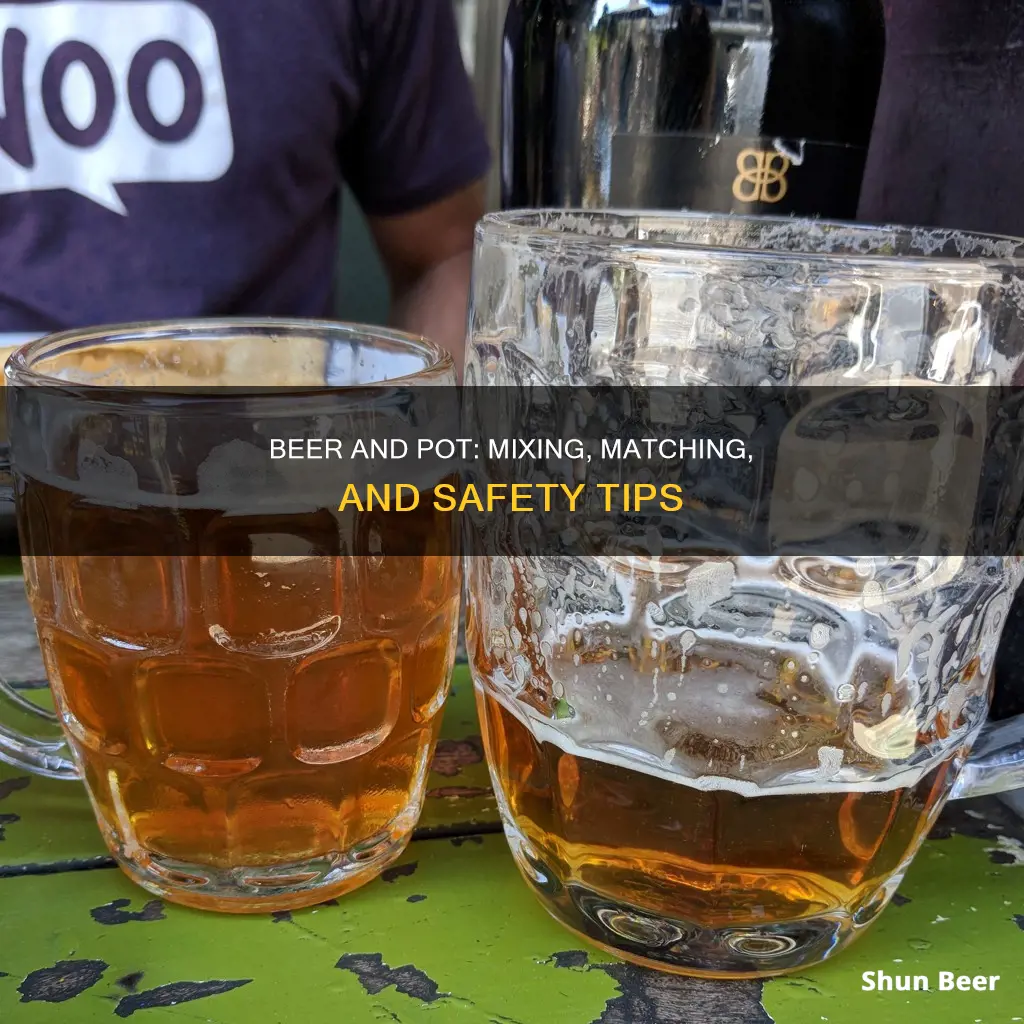
Alcohol and weed are two of the most commonly used substances globally, with 17% of Americans smoking marijuana and 62% drinking alcohol. While the two substances can be consumed separately, their combination, known as crossfading, can lead to intensified effects and adverse reactions. The order of consumption matters too: drinking alcohol before smoking weed can enhance the absorption of THC, the psychoactive component of cannabis, resulting in a stronger high. Conversely, weed before alcohol may slow down the rise in blood alcohol levels, reducing the sensation of drunkenness and making it challenging to gauge one's level of intoxication. This effect can lead to drinking more than usual and increase the risk of alcohol poisoning.
What You'll Learn

The effects of drinking beer and smoking pot
Drinking beer and smoking pot, also known as "crossfading", can lead to a range of effects on the body and mind. While occasional use likely won't lead to major health problems, regular and simultaneous consumption of both substances may have concerning effects over time.
Heightened Effects of THC
When alcohol is consumed before smoking pot, the absorption of tetrahydrocannabinol (THC), the main psychoactive ingredient in cannabis, is increased. This results in a stronger high. A 2015 study found that participants who consumed a small amount of alcohol before inhaling THC had significantly higher THC levels than those who consumed only weed.
Intensified Side Effects
Drinking beer and smoking pot can amplify the adverse effects of cannabis, including anxiety, breathing problems, headaches, impaired judgment, increased heart rate, hallucinations, memory problems, nausea, and paranoia.
Alterations in Judgment and Behaviour
Both alcohol and weed can affect a person's judgment, and this effect may be intensified when they are used together. This combination can lead to blackouts, memory loss, and an increased likelihood of engaging in risky behaviours, such as unprotected sex or driving under the influence.
Increased Risk of Dependence
People who use alcohol and weed together tend to consume more of both substances. This higher intake may increase the risk of developing a dependence on alcohol, weed, or both.
Decreased Cognitive Function
Combining alcohol and weed has been associated with decreased cognitive function and changes in brain structures. Heavy users of both substances have been found to have worse cognitive functioning than those who only consume alcohol.
Dehydration
Alcohol is a diuretic, causing people to produce more urine and lose more fluid than they take in. Using cannabis and alcohol together could intensify this effect, leading to dehydration.
"Greening Out"
Some people, especially those who are not regular weed consumers, may experience a "green out" when mixing alcohol and weed. This refers to a range of unpleasant physical and psychological symptoms, including dizziness, sweating, nausea, vomiting, anxiety, and distress.
Alcohol Poisoning
Drinking large amounts of alcohol can lead to alcohol poisoning, which can be life-threatening. The risk of alcohol poisoning may be higher when mixing alcohol and weed, as weed can make it harder to gauge one's level of intoxication, leading to drinking more than usual.
It is important to note that not everyone reacts the same way to weed, alcohol, or a combination of both, and many factors play a role in how a person will respond. The safest option is to avoid using both substances together, and if concerned about one's use of either or both drugs, speaking to a doctor or seeking help from a helpline is recommended.
Drinking Beer on San Diego Beaches: What's Allowed?
You may want to see also

The health risks of drinking beer and smoking pot
Combining alcohol and cannabis is a dangerous activity that can lead to a range of health risks. While the science behind the interaction between the two substances is still evolving, recent studies indicate that they can amplify each other's effects on the body, resulting in increased impairment.
Short-term Health Risks
When consumed together, alcohol and cannabis can cause a range of adverse effects, including:
- Altered judgment and perception of time
- Coordination and reflex issues
- Impaired cognitive skills
- Increased heart rate
- Anxiety, panic, paranoia, and other mental health issues
- Nausea and vomiting
- Breathing problems
- Hallucinations
- Memory loss
- Blackout
Long-term Health Risks
The long-term effects of combining alcohol and cannabis are less well understood, but they may include:
- Structural changes in the brain
- Increased risk of dependence and addiction
- Liver disease
- Pancreatitis
- Heart damage
- Stomach and digestive issues
- Central nervous system damage
- Erectile dysfunction
- Infertility
- Brain development issues
- Schizophrenia
- Psychiatric illnesses
- Cognitive decline
- Poor attention and memory
- Lowered IQ
Risk of Misuse and Addiction
Both alcohol and cannabis have the potential for misuse and addiction. Alcohol use disorder is a relatively common issue, and cannabis addiction is also surprisingly common, affecting around 30% of users. Combining the two substances can increase the risk of developing a dependence on one or both of them.
Risk of Overdose
While there have been no reported deaths from marijuana overdoses alone, alcohol poisoning from consuming too much alcohol can be fatal. The risk of poisoning increases when alcohol is combined with cannabis, as cannabis can make it harder to vomit, which is the body's way of getting rid of excess alcohol.
Other Considerations
In addition to the direct health risks, there are other factors to consider when combining alcohol and cannabis:
- The order of consumption matters: Smoking weed after drinking alcohol may intensify the effects of weed, while drinking alcohol after smoking weed may slow down the rise in blood alcohol levels, leading to increased alcohol consumption and risky behavior.
- Edibles: Combining edibles with alcohol can be particularly potent and should be avoided. Edibles can produce strong highs, and alcohol can increase hunger, leading to overconsumption.
- Individual factors: The effects of mixing alcohol and cannabis can vary depending on individual factors such as tolerance, pacing, and the type of alcohol and cannabis consumed.
Overall Health Risks
While the direct health risks of combining alcohol and cannabis are significant, it is important to consider the broader impact on health. Alcohol is a leading risk factor for global deaths, with no safe level of consumption. On the other hand, there have been zero documented deaths from marijuana use alone. Additionally, alcohol is linked to a higher risk of cancer, violence, and weight gain compared to cannabis.
A Beer Lover's Guide to Mohegan Sun Fest
You may want to see also

The legality of combining alcohol and cannabis
In the state of Colorado, where cannabis is legal, driving while intoxicated by any substance is illegal. Combining alcohol and cannabis enhances the effects of each, leading to increased impairment, slowed reaction time, loss of coordination, and distorted perception of time and distance. This can be extremely dangerous for drivers, and impairment-related fatalities are on the rise in Colorado.
While the legality of cannabis is changing in some places, it is important to remember that combining substances, including alcohol and cannabis, can have serious health effects and lead to risky behaviours.
Beer and Budesonide: Is It Safe to Mix?
You may want to see also

The impact on driving ability
The impact of drinking beer and smoking pot on driving ability is a complex issue that has been the subject of numerous studies. While there is no definitive answer, the existing research suggests that the combination of alcohol and cannabis can have detrimental effects on driving performance.
Several studies have found that alcohol and cannabis can impair driving-related skills such as reaction time, coordination, and decision-making. The effects of cannabis on driving can vary depending on factors such as tolerance, smoking technique, and absorption of THC, the active ingredient in marijuana. Some research indicates that cannabis users may compensate for these impairments by driving more slowly, passing less, and leaving more space between themselves and other vehicles. However, when cannabis is combined with alcohol, individuals lose the ability to employ these compensatory strategies effectively, resulting in significant impairment even at low doses of either substance.
Epidemiological studies examining the relationship between cannabis use and traffic accidents have yielded mixed results. Some studies suggest that cannabis alone may not increase the risk of accidents or even reduce it, while others indicate a positive correlation between cannabis use and crash risk. The combination of alcohol and cannabis, however, consistently leads to a higher risk of accidents compared to the use of either substance alone.
It is important to note that the effects of cannabis and alcohol on driving performance can vary between individuals, and there are limited data directly comparing the hazards of driving under the influence of cannabis versus alcohol. Additionally, the lack of standardized doses for cannabis makes it challenging to determine the exact impact on driving ability. Nevertheless, experts advise against driving after consuming either substance, and the safest option is to refrain from using both alcohol and cannabis together.
Mouthwash and Beer: Effective Mosquito Repellents or Old Wives' Tales?
You may want to see also

The risk of overdose
While it is rare and controversial, a marijuana overdose is possible in some cases. The risk of overdose increases when marijuana is combined with alcohol.
Combining weed and alcohol can increase the effects of both drugs and cause adverse reactions. Alcohol increases the absorption of tetrahydrocannabinol (THC), the main psychoactive component in cannabis. This can lead to a stronger high and intensify the side effects of cannabis, including anxiety, paranoia, and psychotic reactions.
The consequences of mixing alcohol and weed can be severe, including hangovers, nausea, vomiting, injury, driving under the influence, blackouts, aggression, and unwanted sex. Mixing alcohol with weed edibles is particularly potent and should be avoided.
Additionally, the risk of overdose is higher for individuals with pre-existing health issues, such as heart or breathing problems, and those who use marijuana in combination with prescription medication.
It is important to note that while marijuana overdose is rare, it can still lead to severe side effects and, in extreme cases, death. If you or someone you know is experiencing a marijuana overdose, seek medical attention immediately.
Beer and Buspirone: Is It Safe to Mix?
You may want to see also
Frequently asked questions
Mixing beer and pot can lead to a range of negative side effects, including dizziness, sweating, nausea, distorted senses, impaired movement, increased heart rate, and impaired judgment. The combination of these substances can also increase the risk of accidents, injuries, and sexual assault. Additionally, drinking alcohol before smoking pot can intensify the effects of pot, as alcohol increases the absorption of THC, the main psychoactive ingredient in cannabis.
Mixing beer and pot is not recommended due to the potential negative side effects and increased health risks compared to using either substance alone. The combination can also impair cognitive function and increase the risk of developing a dependence on alcohol, pot, or both.
If you experience a bad reaction to mixing beer and pot, it is important to stay calm and patient as the feelings will subside with time. Find a quiet place to sit or lie down, and ask a friend to help you get home if possible. Drink water to stay hydrated and eat something to boost your blood sugar. If you are experiencing severe or persistent symptoms, seek medical advice or call a substance abuse hotline.







